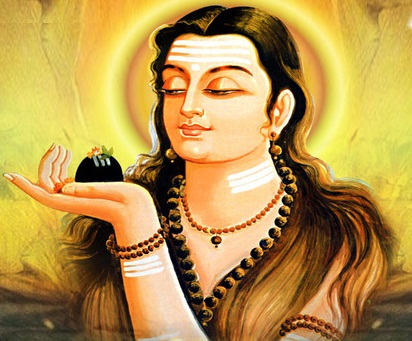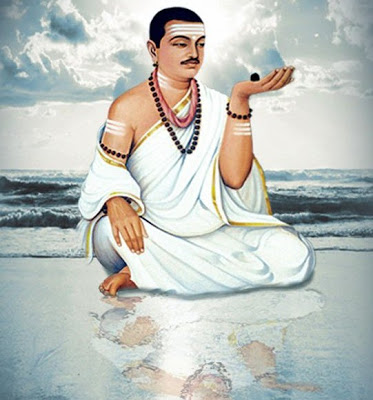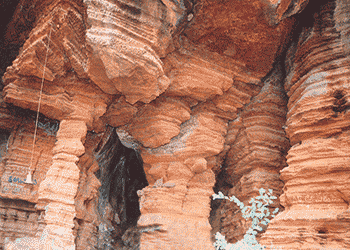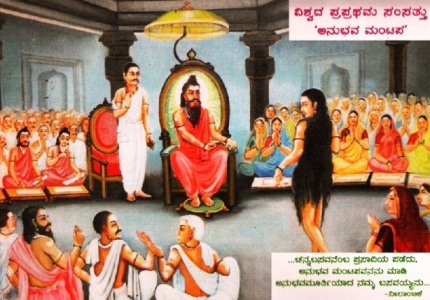Akka Mahadevi: A contributor to the empowerment of women, social reformist & rebel poetess of India. She lived in Karnataka, South India in 12th Century. Akka Mahadevi is and will always remain a great contributor to the empowerment of women in Indian history. A brief write up on the eve of Basava Jayathi, birth anniversary of Jagadguru Basveshwara, founder of Lingayat religion.

Image Credit: https://shivayashiva.wordpress.com/2014/02/24/akka_mahadevi/
Note : My thoughts and reflections are put in italics and historical facts have been picked from various websites .(list of references are mentioned at the end of the write up)
As I read about Akka Mahadevi and her life I had this weird sense of discomfort and restlessness. Till I read her poems, which are like a balm to a yearning and restless soul. Though a rebel in the true sense her poems reflect boundless devotion and humility with no sense of arrogance (her words are sharp as an arrow but, not arrogant as she knows no love beyond God). It’s rare and difficult to be a rebel and yet be poised. She lived to immerse in God Shiva (Chennamallikarjuna, The Beautiful Lord White As Jasmine) and at a tender age of 10 years started worshipping the God and as she bloomed into adolescence Akka considered herself to be married to Chennamallikarjuna.
Here is what she writes about being one with her love. Her poems and life are a picture of apparent devotion and a symbol of rebel; a daring act (read further to know why I refer to her life as a daring act) in the 12th Century.
I am in love with the one
Who knows no death, no evil, no form.
I am in love with the one
Who knows no place, no space,
no beginning, no end.
I am in love with the one
Who knows no fears nor the snares
of this world,
the Boundless One who knows no bounds.
More and more I am in love
with my husband
known by the name of Chennamallikarjuna.
Take these husbands who die and decay,
and feed them to your kitchen fires!
Deeply immersed not in the bodily treasures but, smitten by the soulful devotion for the Lord, she embraces the creator with intense desire for union and longing which reflect in her simple and profound words, her poems. She has to her credit around 300 vachanas. Her poems are passionate and pierce your soul with simple words.
I look at the road for His coming.
If He isn’t coming, I pine and waste away.
If He is late, I grow lean.
O mother, if He is away for a night,
I’m like the lovebird with
nothing in her embrace.
Lingayatism:
Reformist Movement of Karnataka:

Image Credit: http://timepassri.blogspot.in/2011/11/blog-post_25.html?view=classic
In the 12th century a reformist movement spread in Karnataka, which changed social and religious thinking. It shook the edifice of orthodox thinking and dominance of Brahmins by challenging the caste system, a weapon to subjugate a selected class of society. The founder of this reformist movement was Basaveshwara, Prime Minister of King Bajjala ruling over Kalachuri Empire. He rebelled against the orthodox rules of caste system by praising marriage between a Brahmin woman and an untouchable man. He believed in equality and professed that all members of the society are labourers, some intellectual and some manual. One of his monumental works has been the establishment of Anubhava Mantapa. It was like the modern Parliament open to discussion, a place where people from different professions, ranks, from persons to peasant met. Equal rights were given to all sections of society with 60 women mystics. It propagated casteless and creedless society with respect for human values inscribed through the Vachanas.
Presided by Allama Prabhu various Sharanas from all over Karnataka and India participated. Sharanas belonged to the lower strata of society called as Shudras according to the caste system or Varna System of Hindusim.
What are Vachanas?
They are simple stanzas in Kannada using colloquial language, easy to understand and reflecting truths to life. They have a deep and insightful meaning but, easy for everyone to understand. In the Middle Ages of Medieval Period (5th to 15th Century) Devotion or Bhakti was the prerogative of the Brahmins whose literature was restricted to Sanskrit language reserved for the upper caste. Vachanas changed all of this and thus, hold a significant place in Kannada literature. Vachanas opened the doors for the common man to enjoy the pleasure of worshipping Lord Shiva and expressing their devotion for him in vernacular language.
Vachanas penned by Akka Mahadevi:
Akka Mahadevi lived in South India in the 12 Century, born in Udutadi in the city of Banavasi in Shimoga district. She was born in 1150 AD to Nirmalshetti and Sumati, who were great devotees of Shiva. As she grew Akka Mahadevi started immersing herself in the devotion and love of her life; Chennamallikarjuna (Lord Shiva). King Kaushika was floored by her beauty. She was a stunning beauty but, oblivious of the worldly desires, living solely for her God. King Kaushika passionately fell in love with Akka Mahadevi the moment he saw her and asked her to marry him. But, for a devotee nothing is beyond the love of God. She rebuffed his proposal to rebuke him by saying;
“But for my Chennamallikarjuna, all men are mere dolls!”:
Fie on this body!
Why do you damn yourself
in love for it—
this pot of excrement,
this vessel of urine,
this frame of bones,
this stench of purulence!
Think of the Lord, Chennamallikarjuna!
Along with reflecting her disapproval she shows an intense drive to renounce all bodily and worldly pleasures which is quite unusual for a strikingly beautiful and young woman.
King Kaushika wouldn’t just give up and threatened her family, she relentlessly agreed to marry him but, with the condition that he wouldn’t come close to her without her consent. The marriage was not to last as she never let him come near her. Kaushika was frustrated and Mahadevi wished to walk out on him. As she was to leave him, he demanded all the expensive jewels and clothes that he had presented. A rebel that she was at a young age she stripped in a court full of people and walked away naked on the streets.
She reflects:
The last thread of clothing
can be stripped away,
But who can peel off Emptiness,
that nakedness covering all?
Fools—while I dress in the Jasmine Lord’s morning light, I cannot be shamed;
what would you have me hide under, silk and the glitter of jewels?
As she started preceding to Anubhava Mantapa her parents and friends warned her about the path she had chosen and the difficulties she would face. With unflinching faith she poignantly answered:
“I am no helpless woman
I utter no futile threats
I am nothing daunted
I shall dare hunger and pain
I shall steal out of withered leaves
A wholesome meal
And on pointed sword
Shall make my bed.
I am ready for your sake
To dare the worst
To die this instant
The readiness is all
Oh! my Channamallikarjuna”.
Image Credit: http://lingayatreligion.com/LingayatBasics/Anubhava_Mantapa.htm
She covered the long distance braving the rugged path and reached Anubhava Mantapa. The journey was not to end here. It had just begun. Her naked appearance made the saints at Anubhava Mantapa uncomfortable; she was stopped and probed by the founder Basaveshwara and President of Anubhava Mantapa, Allama Prabhu. After an interesting dialogue she was welcomed there. She lived there and proceeded on the path of spirituality. She describes her experience here in simple words:
“I sing, dance, hear, walk and speak in happy fellowship with thy saints,
Oh! Lord…. Through conversation with the blessed ones,
I have gained respite from my grief.
Oh! Lord, I cannot bear parting from the blessed ones who know Thee.
When a soul rubs another and divine experience is born, the traits of the body are all burnt.
The infirmity of my body is no more; the tremor of my senses is now stilled; the mind perplexed is now calm and serene.
All this I gained through the company of the saints.
After a few years she went to Shiva temple at Sri Sailam in Andhra Pradesh. She spent her last few days in the caves attaining Mahasamadhi (divine union with God).

Image Credit: http://www.natgeotraveller.in/web-exclusive/web-exclusive-month/your-travel-secrets-about-hidden-india/
She is and will always remain a great contributor to the empowerment of women in Indian history.
“I am without pride of caste
Without pride of resolute will am I.
I have cast away the arrogance of riches,
Of the pride of learning also I have none.
No manners of pride dare some near me,
For Thou hast blest me with Thy Grace.”
“Like treasure hidden in the ground, like flavour in the fruit, like gold in the rock and oil in the seed, the Absolute is hidden in the heart.” “Like the peacock that dances on a hill, like the swan that splashes around a lake, like the cuckoo that sings when the mango tree bursts into bloom, like the bee that enjoys only the fragrant flower, I will enjoy only my Lord Chennamallikarjuna.”
She guides the devotees through this powerful verse. This is how a devotee should worship the Lord with intensity that destroys the body and dissolves with the creator.
“The arrow that is shot should penetrate so deeply
that even the feathers do not show.
Hug the body of the Lord so tightly
that the bones must be crushed to crumble.
Weld to the divine until the very welding disappears. “
This verse is much soothing and calms an agitated mind with the sweet musical words of love and devotion.
“With thy sweet soul, this soul of mine
Hath mixed as water doth with wine
Who can the wine and water part
Or me and Thee when we combine
Thou art become my greater self
Small bonds no more can confine
Thou hast my being taken on
And shall not I now take on Thine?
Me Thou for ever hast affirmed
That I may ever know thee mine
Thy love has pierced me through and through
Its thrill with bone and nerve entwine
I rest a flute laid on Thy lips
A flute, I on thy breast recline
Breathe deep in me that I may sigh
Yet strike my strings and tears shall shine.”
She begged to Lord Shiva in her daily prayers:
“Shiva let no food come my way. Let my body also express the longing and anguish that I am going through to become part of you. If I eat, my body will be satisfied. My body will not know what I am feeling. So let no food come towards me. If food does come into my hands, let it fall down in the mud before I put it into my mouth. If it falls in the mud, the fool that I am, before I pick it up, let a dog come and take it away.”
A few words by me to conclude:
My body is perishing each moment
To be immersed in thee.
Dissolving in you I fall at your feet with my famished body unable to carry it through the duress of desires.
In the destructible world you are the only resolute force, endless, limitless and indestructible.
© Copyright 2016 Rashmi S. Malapur All rights reserved.
References:
The translated poems and facts have been picked from the below references:
http://www.hinduismtoday.com/modules/smartsection/item.php?itemid=5521
http://www.indianscriptures.com/gurus/devotees/akka-mahadevi
http://www.hinduismtoday.com/modules/smartsection/item.php?itemid=5521
http://www.thehindu.com/features/metroplus/akka-mahadevi-shiva-in-her-soul/article5722583.ece
http://lingayatreligion.com/Sharanaru/Akkamahadevi.htm
http://www.poemhunter.com/akka-mahadevi/biography/
http://www.virashaiva.com/akka-mahadevi-the-genuine-mystic/

Thank you Pedrol for the instant like. Mikaela Huang you have a great collection of clicks on your website. Thanks so much for liking my post.
LikeLike